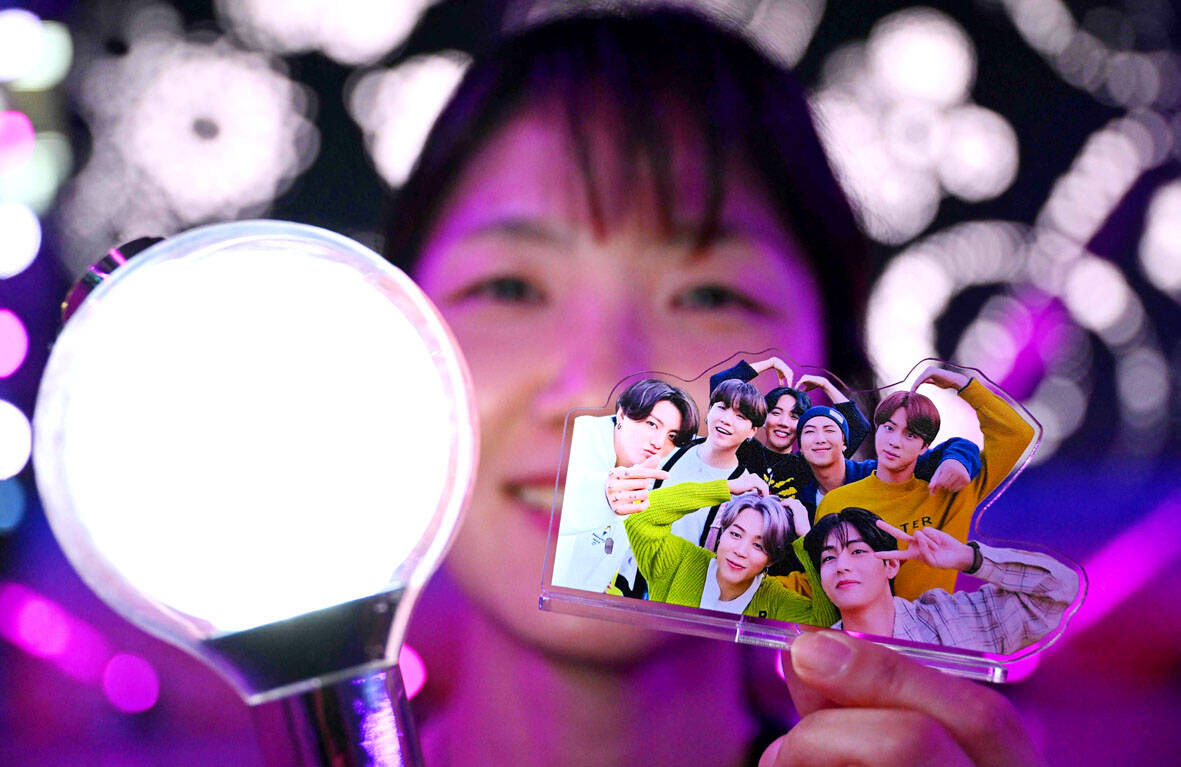K-pop megaband BTS is back from military service, and their international fandom — long known for its progressive activism — is celebrating by rallying behind a cause: adoptees from South Korea.
Now Asia’s fourth-largest economy and a global cultural powerhouse, the idols’ native South Korea remains one of the biggest exporters of adopted babies in the world, having sent more than 140,000 children overseas between 1955 and 1999.
The country only recently acknowledged, after years of activism by adult adoptees, that the government was responsible for abuse in some such adoptions of local children, including record fabrication and inadequate consent from birth parents.

Photo: AFP
The septet’s fandom, dubbed ARMY, is known for backing causes like Black Lives Matter and ARMY4Palestine, and launched the #ReuniteWithBTS fundraising project last week to support Korean adoptees seeking to reconnect with or learn about their birth families, which can be a painful and legally tricky process.
Almost all of BTS members have completed South Korea’s mandatory military service, required of all men due to the country’s military tensions with North Korea.
“We are celebrating both the reunion of BTS and ARMY, and BTS members being able to reunite with their own family and friends,” the BTS fan group behind the initiative, One In An ARMY, said.
“Helping international adoptees reunite with their birth country, culture, customs and families seemed like the perfect cause to support during this time.”
The fans are supporting KoRoot, a Seoul-based organization that helps Korean adoptees search for their records and birth families and which played a key role in pushing for the government to recognize adoption-related abuses.
Peter Moller, KoRoot’s co-representative, said it was “very touching” that the BTS fans had taken up the cause, even though “they’re not even adoptees themselves.”
For many adoptees, seeing Korean stars in mainstream media has been a way for them to find “comfort, joy and a sense of pride” in the roots that they were cut off from, KoRoot’s leader Kim Do-hyun added.
SOFT POWER
BTS, who have discussed anti-Asian hate crimes at the White House and spoken candidly about mental health, have long been considered one of the best examples of South Korea’s soft power reach.
For years, Korean adoptees — many of whom were adopted by white families globally — have advocated for their rights and spoken out about encountering racism in their host countries.
Some adoptees, such as the high-profile case of Adam Crapser, were later deported to South Korea as adults because their American parents never secured their US citizenship.
Many international adoptees feel their immigration experience has been “fraught,” Keung Yoon Bae, a Korean studies professor at Georgia Institute of Technology, said.
Some adoptees have found that, like Crapser, their guardians failed to complete the necessary paperwork to make them legal, she said.
This is becoming a particular problem under US President Donald Trump, who is pushing a sweeping crackdown on purported illegal immigrants.
Bae said it was possible that “‘accidentally illegal’ adoptee immigrants may fall further through the cracks, and their deeply unfortunate circumstances left unremedied.”
THE WHALE
Reunions between Korean adoptees and their birth families can be emotionally complex, as Kara Bos — who grew up in the US — experienced firsthand when she met her biological father through a landmark paternity lawsuit.
During their encounter in Seoul in 2020, he refused to remove his hat, sunglasses or mask, declined to look at her childhood photos and offered no information about her mother. He died around six months later.
“The journey of birth family searching is very lonely, difficult and costly. Many adoptees do not even have the means to return to their birth country let alone fund a family search,” Bos, 44, said.
To have BTS fans rally around adoptees and provide help with this complex process is “a wonderful opportunity,” she said.
For Malene Vestergaard, a 42-year-old Korean adoptee and BTS fan in Denmark, the group’s song Whalien 52, which references a whale species whose calls go unheard by others, deeply resonated with her.
“I personally sometimes feel like that whale. Being amongst my peers, but they will never be able to truly understand what my adoption has done to me,” she said.
“For me, finding BTS at the same time I started looking for my birth family and the truth about my adoption and my falsified papers, was such a comfort.”
Vestergaard said the grief woven into her adoption would never go away, but that “BTS and their lyrics have made it easier to reconcile with that truth.”

The Lee (李) family migrated to Taiwan in trickles many decades ago. Born in Myanmar, they are ethnically Chinese and their first language is Yunnanese, from China’s Yunnan Province. Today, they run a cozy little restaurant in Taipei’s student stomping ground, near National Taiwan University (NTU), serving up a daily pre-selected menu that pays homage to their blended Yunnan-Burmese heritage, where lemongrass and curry leaves sit beside century egg and pickled woodear mushrooms. Wu Yun (巫雲) is more akin to a family home that has set up tables and chairs and welcomed strangers to cozy up and share a meal

Dec. 8 to Dec. 14 Chang-Lee Te-ho (張李德和) had her father’s words etched into stone as her personal motto: “Even as a woman, you should master at least one art.” She went on to excel in seven — classical poetry, lyrical poetry, calligraphy, painting, music, chess and embroidery — and was also a respected educator, charity organizer and provincial assemblywoman. Among her many monikers was “Poetry Mother” (詩媽). While her father Lee Chao-yuan’s (李昭元) phrasing reflected the social norms of the 1890s, it was relatively progressive for the time. He personally taught Chang-Lee the Chinese classics until she entered public

Last week writer Wei Lingling (魏玲靈) unloaded a remarkably conventional pro-China column in the Wall Street Journal (“From Bush’s Rebuke to Trump’s Whisper: Navigating a Geopolitical Flashpoint,” Dec 2, 2025). Wei alleged that in a phone call, US President Donald Trump advised Japanese Prime Minister Sanae Takaichi not to provoke the People’s Republic of China (PRC) over Taiwan. Wei’s claim was categorically denied by Japanese government sources. Trump’s call to Takaichi, Wei said, was just like the moment in 2003 when former US president George Bush stood next to former Chinese premier Wen Jia-bao (溫家寶) and criticized former president Chen

President William Lai (賴清德) has proposed a NT$1.25 trillion (US$40 billion) special eight-year budget that intends to bolster Taiwan’s national defense, with a “T-Dome” plan to create “an unassailable Taiwan, safeguarded by innovation and technology” as its centerpiece. This is an interesting test for the Chinese Nationalist Party (KMT), and how they handle it will likely provide some answers as to where the party currently stands. Naturally, the Lai administration and his Democratic Progressive Party (DPP) are for it, as are the Americans. The Chinese Communist Party (CCP) is not. The interests and agendas of those three are clear, but